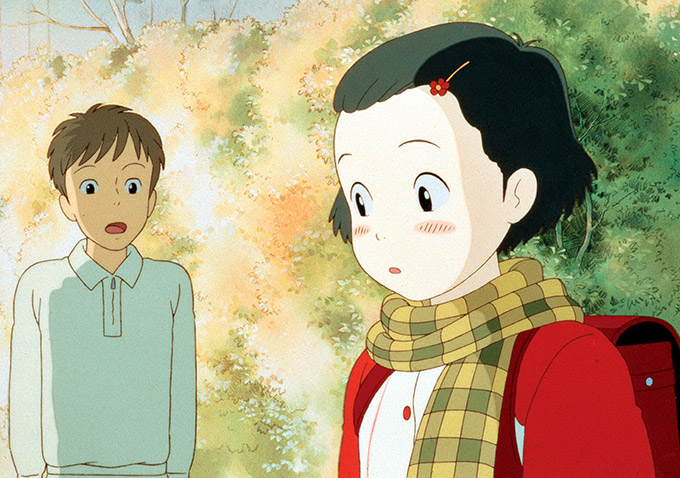Studio Ghibli, particularly via the films of Hayao Miyazaki, has rightfully earned its reputation for producing wildly original, distinctly beautiful, and deeply intelligent animated movies for kids, that are in a different ballpark than their North American counterparts. But over the years, they have also crafted well respected films for adults. And finally getting a proper theatrical release in the United States is Isao Takahata’s grown up 1991 picture “Only Yesterday,” a layered and complex story about a young woman whose reflections on her childhood memories, allow her to embrace who she has become.
Set in 1982, 27 year-old Taeko (voiced by Daisy Ridley in the new English language dub track; I viewed the original Japanese language version with the voice of Miki Imai) works a respectable but not quite fulfilling office job, and when the story kicks off, she’s about to go on vacation. While Taeko tells her co-workers she’ll be relaxing, and visiting relatives in the country, the truth is she’ll be going to help her brother-in-law’s family harvest safflower. But no sooner has she started to pack and begin her journey, then a rush of memories from when Taeko was in fifth-grade arrive, and they continue as she makes her way Yamagata, starts her work, and strikes up a close friendship with Toshio (Dev Patel/Toshirô Yanagiba).
That’s about all the plot Takahata offers in “Only Yesterday,” but from it he mines rich thematic texture about the events that form our perspective on the world, and shape who we become. Jumping between 1982 and 1966, Taeko’s internal reflections soon become part of her adult narrative, as she starts sharing some of her mostly melancholy and nostalgic stories with Toshio, and others at the rural farm. And what emerges eventually develops into an elegy for a woman who spent her formative years barred from making any demonstrative displays that fell outside of rigid and conservative views of decorum, and fought through shame about her body, only to eventually realize modernity now allows her to make the choices that seemed unthinkable then, and be comfortable in her own skin.
One of the film’s extended passages finds young Taeko learning about menstruation, and detailing the fear she and her friends felt at being stigmatized by a perfectly normal bodily function. And it’s a feeling not helped by their male classmates, who in their ignorance and working from second-hand knowledge, take to looking up their skirts, trying to figure out who is on their period. She also learns early on that any fantasies she might have of creative pursuits will not be tolerated. After impressing in a one-line part in a school play that she cleverly expanded upon through her own initiative, a college production asks her mother for permission to cast young Taeko in a lead role. But her father, notably an either absent or silent, but no less foreboding presence, has the final word, and swiftly strikes down the opportunity for Taeko to express herself and perform, despite the excitement from the young girl, her mother, and sisters. The decision is given no further discussion or debate, and Taeko must reconcile her disappointment. But what leaves the most lasting impression on Taeko, is a moment she still struggles to puzzle out later in her life: why her father slapped her — the only time he ever hit her — when she stepped outside the house without her shoes.
Takahata plays these reflections with a quiet, gently paced hand, creating a story that slowly unfolds a portrait of two like souls who find a common connection. As a grown woman, unmarried and without children, which stands as unusual in her culture, Taeko becomes the outsider that her childhood suggested she always was, leading to this search through her memories to pinpoint the markers of her journey. And Toshio is also going through a particularly reflective phase. Chatty, and genuinely curious, not only about the world around him (he’s a fan of Hungarian music), but about Taeko’s thoughts and feelings too, he also stands apart, choosing organic farming over chasing the salaryman path that many of his friends followed from Yamagata to Tokyo. And naturally, a spark forms between the pair who are bonded by seeking a greater satisfaction from the world beyond the standard expectations of work and family.
For those who enjoy Studio Ghibli’s more outwardly visual flourishes, there is little of that here, with Takahata choosing a more painterly, and undeniably gorgeous and breathtaking approach. There are a couple of brief segments in which particular memories get enhanced with dreamlike sequences (one in particular with Taeko and her first crush Hirota experiencing an early blush of romance is truly lovely), but the preference toward a restrained and detailed, but no less stunning animation style goes a long way in allowing the film’s subtle drama to blossom. However, for all that care, “Only Yesterday” never achieves the cumulative emotional payoff you hope it does. And while the film’s final sequence, which plays out over the end credits, is a creative sidestep around the kinds of narrative conventions that the picture otherwise largely avoids, it still feels like a compromise.
“Live long enough, and you see many different things,” Taeko’s grandmother sagely says, and it’s essentially the film’s thesis statement. With “Only Yesterday,” Takahata not only succeeds in transmitting how years can flash by, also the way that passage of time makes clearer the moments that define our character, and go on to influence how we choose live later. It’s not a new notion, but it’s one chronicled refreshingly through the eyes of a young woman, in a film that itself plays like View — Master reel of memories, ones that linger long after the movie is over. [B+]
"Only Yesterday" opens in limited release on Friday.

